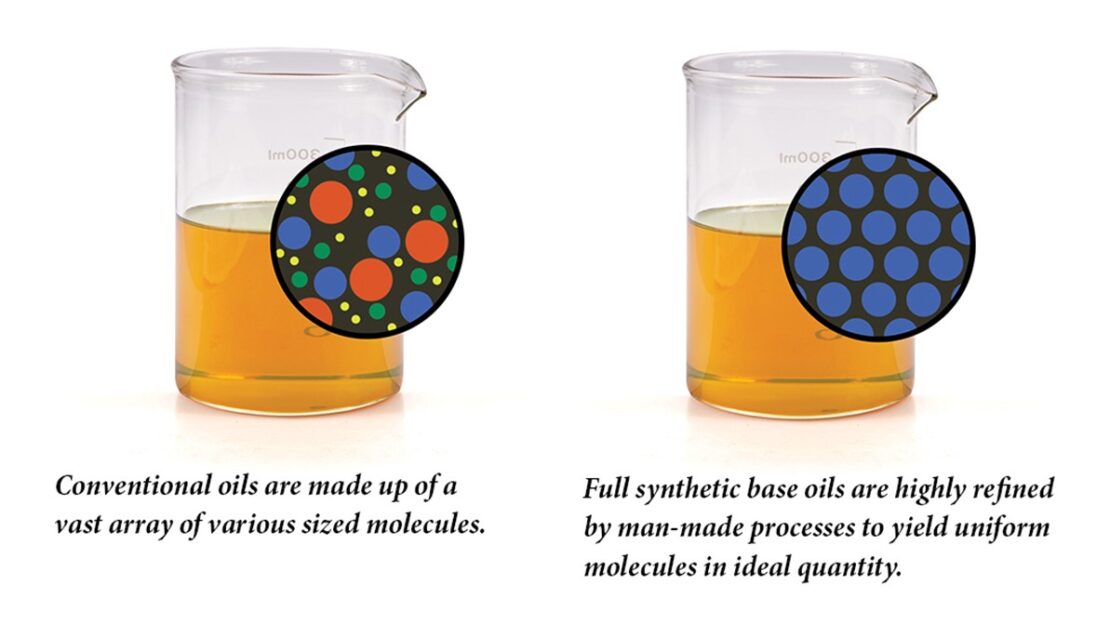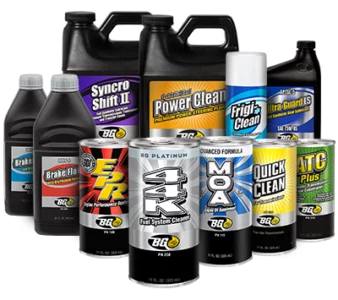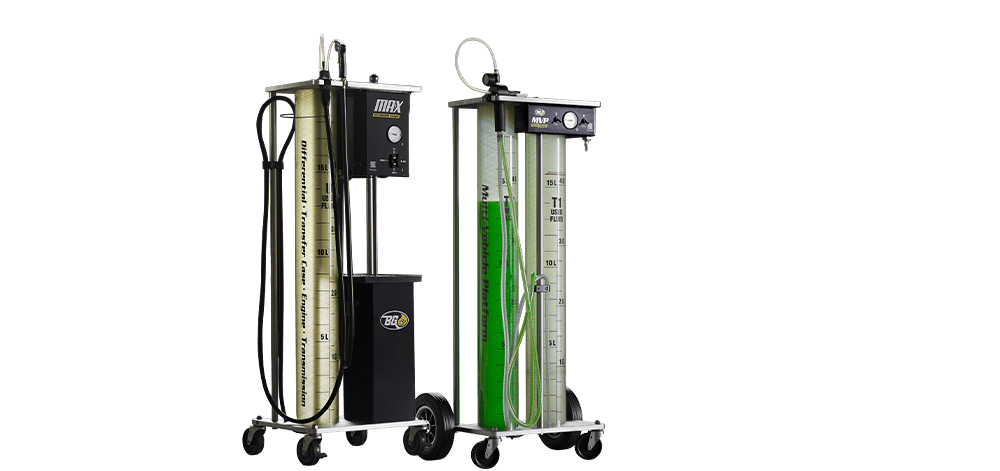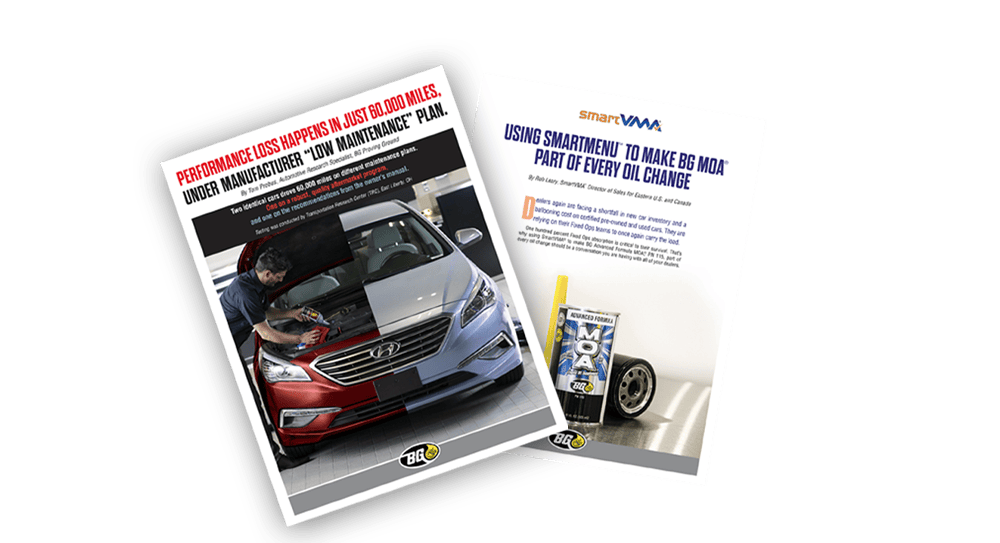by Clinton J. Meyer, Technical Service Representative
The word synthetic has morphed into one of today’s trending adjectives often used to describe a quality aspect of a material or product. Along with “nano,” “hybrid,” and more, “synthetic” sound scientific and intriguing but what does it really mean?
The debate between conventional and synthetic engine oil use has been discussed for years. For many, the most common question surrounding synthetic engine oil is: What makes it different? Further clouding this discussion is the subject of semi-synthetic engine oil. Let’s take a look at what makes each type of oil different.
Engine oils are blended with two primary components: 1) base oil and 2) additives.
Base oil
Base oil is the primary component of engine oil. It provides the fundamental function of lubricating and cooling mechanical components. Different types and quantities of base oil are combined with specific physical characteristics such as viscosity and shear resistance. The quality and level of refining in base oil determine the finished product’s categorization as conventional, semi, or full synthetic.

Additives
Additives provide additional physical and chemical characteristics to the lubricant such as anti-wear and oxidation protection. ALL OF TODAY’S MODERN ENGINE OILS HAVE ADDITIVES! Engine oil is blended in a combination of specific physical and chemical requirements to meet certain categories and specifications. There is no additive that can turn conventional oil to semi or full synthetic oil. However, the physical and chemical properties can be improved by additional additive use (i.e. BG products).
API engine oil categories
According to the API (American Petroleum Institute), there are four primary engine oil categories in use today.
In gasoline engines, the API SN category combines the latest requirements for deposit protection, sludge control, and seal compatibility. A further improved subcategory of API SN called ILSAC GF-5, includes improved fuel economy, protection of emissions and turbocharger equipment, as well as compatibility up to E-85 ethanol fuel blends.
Diesel engines have two oil categories named CK-4 and FA-4. These categories bring the latest requirements to protect emission and aftertreatment equipment, prevent soot-related issues, and protect against engine wear and deposits, all while making use of ultra-low sulfur diesel fuel. The FA category has more strict requirements regarding viscosity and high-temperature high shear, and further emphasizes protection of vehicle emission and aftertreatment systems.*
It is important to note that these engine oil categories are independent of the oil being conventional, semi, or full synthetic.

Two components, four categories… but what answers our question?
Conventional oil
Contrary to popular belief, conventional oils can indeed be high quality products and can meet any of the above listed categories. “Conventional” simply means it’s comprised of a more natural form of petroleum. These oils are made up of a vast array of various sized molecules and meet specific requirements.
Because the consistency of conventional base oil is not highly uniform or refined, it tends to yield issues when exposed to extreme temperatures.
At very cold temperatures, conventional oil does not flow as readily as synthetic, potentially leading to component wear.
At very high temperatures, smaller and more volatile parts of conventional oil may evaporate, leading to oil consumption or loss. This may also lead to premature breakdown of the oil, or changes in viscosity. Without all the extra refining processes used, conventional oil typically costs considerably less than full synthetic. BG Products, Inc., does not offer any conventional engine oils. Our specialty lies in the area of performance.
Synthetic oil
The word “synthetic” is defined by Merriam-Webster as “of, relating to, or produced by chemical or biochemical synthesis; especially: produced artificially.”** In essence, it defines something made or altered by man that cannot readily be found in nature.
Full synthetic base oils are highly refined by man-made processes to yield uniform molecules in ideal quantity. The blend of oils can be tailored to a specific application for maximum performance.
Full synthetic engine oils tend to perform exceedingly well, even in extreme temperatures. They flow quite readily in very cold temperatures and resist breaking down in very hot temperatures. Performance and longevity (drain interval) can be maximized while making use of fully synthetic base oils. Extra refining and processing are necessary to yield high-quality uniform base oils, and thus often incur additional costs over conventional oils.
BG Products, Inc., offers several high quality full synthetic gasoline and diesel engine oils meeting API SN/CK-4 categories.

Semi-synthetic oil
Semi-synthetic oils aim to combine the improved performance of full synthetic engine oils with the lower costs of conventional oils. The frequent result of this combination is a well-balanced compromise between performance and affordability. There is no standard that dictates the ratio of conventional oil to synthetic base oil used in a semi-synthetic blend. Often, the ratio is quite close to 50–50, but there is no mandate regarding this concept. BG Products, Inc., offers several true 50–50 semi-synthetic engine oils for both gasoline and diesel engines meeting API SN/CK-4 categories.
In a world full of trending and viral words, it is important to recognize what these words really illustrate. Understanding the differences between conventional, semi, and full synthetic oil can provide the best insight to fulfill the needs of your vehicle’s performance. Here at BG, we continue to work hard to bring the best in both performance and protection so our customers’ choices are easy.
With chemistry, there is always a solution.

by Clinton J. Meyer
Technical Service Representative
ACS Certified in Chemistry and Biochemistry
References for this article:
*The American Petroleum Institute (API): http://bgfor.me/API and http://bgfor.me/apimom
**Merriam-Webster: http://bgfor.me/synthetic






